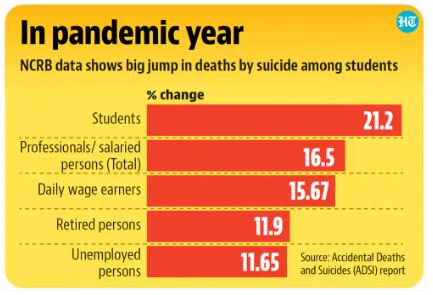Paying Attention to Biting Your Nails: Stress in Young People
As youngsters, it is important to keep a lookout for behavioural indicators of stress including fatigue, disengagement, irritability, and social isolation

Credits: Health Day News
March 28, 2022
Contrary to the picturesque scene portrayed in movies in which teenagers have their hair down and live light and carefree lives‒ young adults today carry more stress than ever.
A study published in 2010 found that 20% of Indian adolescents experienced mild to extreme stress. Since the pandemic, these stress levels have skyrocketed. In 2020, over 12,500 students died by suicide at a rate of over 34 suicides a day. These statistics become more alarming especially considering the stigmatization of mental health amongst the Indian youth.

Credits: Hindustan Times
According to ‘The State of the World’s Children 2021’ report, only 41% of Indians aged 15 to 24 favoured seeking support for mental health issues making India one of only 21 countries in which a minority of young people believed in reaching out. This paints a dangerous image of how young Indians may be coping with stress, with fear and denial preventing them from seeking help.
Stress among the young populace can crop up for a variety of reasons including academic or work pressure, issues with friends or family, distressing world events, or anxieties related to body image. Stress not only impacts mental health but physiological health as well, causing students to sleep less and skip meals. Oftentimes, young people cannot recognise how stressed they are since their minds are heavily preoccupied. It is important to keep a lookout for behavioural indicators of stress including fatigue, disengagement, irritability, low concentration, and social isolation.
So how do we go about it?
Here are some techniques that young people can employ to reduce stress:
Exercise
As cliched as it may sound, one of the best ways to get those endorphins up is to get your body moving. Exercise does not have to be limited to standard running or weight training; you can find activities that you enjoy such as dancing, swimming, or power yoga.
Mindfulness
Bringing awareness to your thoughts and emotions is an effective way to relax. Since mindfulness can seem like an abstract concept, various mobile software apps like Headspace and Calm also offer programs to guide you through mindfulness techniques.

Credits: Callum Shaw
Reaching out to support systems
Whether it is to your family, friends, or professional help, it is important to voice your feelings to someone. Even if you aren’t seeking advice, having someone listen to you helps deal with feelings of stress. If you feel unable to talk to someone in your personal life, websites like 7 cups offer free listeners and counselling.
Social media detox
Having the world’s carefully curated highlight reels at your fingertips can be overwhelming and make you feel inadequate. If the comparison game is causing you stress, the best thing may be to stop checking your social media, even if only for a few days, to give your racing mind time to recharge.
While stress is an unavoidable part of life, make sure that you have stress-relieving techniques like these in place to take care of your mental health in the long term. Managing your stress in a healthy way will allow you to improve your physiological health, productivity, and overall wellbeing.
Author: Advika Anand is an intern at Jindal Institute of Behavioural Sciences
